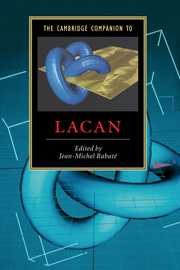Book contents
- Frontmatter
- 1 Lacan’s turn to Freud
- 2 The mirror stage: an obliterated archive
- 3 Lacan’s myths
- 4 Lacan’s science of the subject: between linguistics and topology
- 5 From the letter to the matheme: Lacan’s scientific methods
- 6 The paradoxes of the symptom in psychoanalysis
- 7 Desire and jouissance in the teachings of Lacan
- 8 Lacan and philosophy
- 9 Lacan’s Marxism, Marxism’s Lacan (from Žižek to Althusser)
- 10 Ethics and tragedy in Lacan
- 11 A Lacanian approach to the logic of perversion
- 12 What is a Lacanian clinic?
- 13 Beyond the phallus: Lacan and feminism
- 14 Lacan and queer theory
- 15 Lacan’s afterlife: Jacques Lacan meets Andy Warhol
- Further reading
- Index
- Series List
9 - Lacan’s Marxism, Marxism’s Lacan (from Žižek to Althusser)
Published online by Cambridge University Press: 28 May 2006
- Frontmatter
- 1 Lacan’s turn to Freud
- 2 The mirror stage: an obliterated archive
- 3 Lacan’s myths
- 4 Lacan’s science of the subject: between linguistics and topology
- 5 From the letter to the matheme: Lacan’s scientific methods
- 6 The paradoxes of the symptom in psychoanalysis
- 7 Desire and jouissance in the teachings of Lacan
- 8 Lacan and philosophy
- 9 Lacan’s Marxism, Marxism’s Lacan (from Žižek to Althusser)
- 10 Ethics and tragedy in Lacan
- 11 A Lacanian approach to the logic of perversion
- 12 What is a Lacanian clinic?
- 13 Beyond the phallus: Lacan and feminism
- 14 Lacan and queer theory
- 15 Lacan’s afterlife: Jacques Lacan meets Andy Warhol
- Further reading
- Index
- Series List
Summary
The first question to be posed in an essay addressing Lacan's Marxism must be: can such a thing be said to exist? In the absence of any profession of socialist allegiance on Lacan's part, and given his notorious allergy to institutionalized political commitment, the relevance of Marxist doctrine or methodology to Lacan's theory cannot be presumed but must rather be interrogated and qualified. Do those elements of Marxist theory - individual concepts and broader paradigms alike – that are scattered in Lacan's discourse find their way back out again with all their force and defining political impetus?
Slavoj Žižek , the figure most often identified with a combined Marxist-Lacanian approach to cultural politics, has acknowledged the need to dispel some uncertainty on this point. It is worth exploring in some detail the roots of what may be called Žižek ’s “Lacano-Marxism,” since one may safely assert that it is because of the strong impact and infectious charm of Žižek ’s many books that Lacan’s name has remained so popular in English-speaking countries and has moreover weathered the anti-theoretical storm of the nineties. After having explored Žižek ’s unique visibility as a self-appointed Marxist Lacanian, I want to then go back in time and engage with Louis Althusser, whose unorthodox, not to say heterodox tendencies in the sixties were all but confirmed, in the eyes of the French Communist Party, by his dalliance with the “decadent” enterprise of psychoanalysis.
- Type
- Chapter
- Information
- The Cambridge Companion to Lacan , pp. 153 - 172Publisher: Cambridge University PressPrint publication year: 2003
- 5
- Cited by



